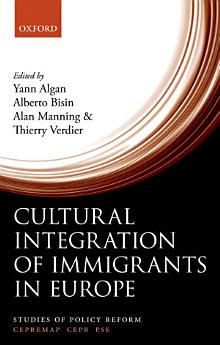Cultural Integration of Immigrants in Europe
Yann Algan · Alberto Bisin · Alan Manning · Thierry Verdier
កញ្ញា 2012 · Oxford University Press
4.0star
ការវាយតម្លៃ 2report
សៀវភៅអេឡិចត្រូនិច
344
ទំព័រ
family_home
មានសិទ្ធិ
info
reportការវាយតម្លៃ និងមតិវាយតម្លៃមិនត្រូវបានផ្ទៀងផ្ទាត់ទេ ស្វែងយល់បន្ថែម
អំពីសៀវភៅអេឡិចត្រូនិកនេះ
This is an open access title available under the terms of a CC BY-NC-ND 3.0 International licence. It is free to read at Oxford Scholarship Online and offered as a free PDF download from OUP and selected open access locations. The concepts of cultural diversity and cultural identity are at the forefront of the political debate in many western societies. In Europe, the discussion is stimulated by the political pressures associated with immigration flows, which are increasing in many European countries. The imperatives that current immigration trends impose on European democracies bring to light a number of issues that need to be addressed. What are the patterns and dynamics of cultural integration? How do they differ across immigrants of different ethnic groups and religious faiths? How do they differ across host societies? What are the implications and consequences for market outcomes and public policy? Which kind of institutional contexts are more or less likely to accommodate the cultural integration of immigrants? All these questions are crucial for policy makers and await answers. This book aims to provide a stepping stone to the debate. Taking an economic perspective, this edited collection presents a current, comparative picture of the process of cultural integration of immigrants across Europe. It documents the main economic debates on the causes and consequences of cultural integration of immigrants, and provides detailed descriptions of the cultural and economic integration process in seven main European countries, including France, Germany, Italy, Spain, Sweden, Switzerland, and the United Kingdom. It also compares the European context with the integration of immigrants in the United States.
ការដាក់ផ្កាយ និងមតិវាយតម្លៃ
4.0
ការវាយតម្លៃ 2
អំពីអ្នកនិពន្ធ
Yann Algan received his Ph.D. from Universite La Sorbonne. He was visiting scholar at MIT and Harvard before becoming Professor of economics at Sciences Po. His main research is devoted to cultural economics and social capital. Alberto Bisin is Fellow of the NBER, IGIER at Bocconi University, CESS at NYU, and CIREQ at the Universite de Montreal. He is Associate Editor of the Journal of Economic Theory, of Economic Theory, and of Research in Economics. He holds a Ph.D. from the University of Chicago, obtained in 1994.His main contributions are in the fields of Social Economics, Financial Economics, and Behavioral Economics. Alan Manning is Director of the Community Programme within the Centre for Economic Performance at LSE. His main area of research is labour economics including the study of immigrants. Thierry Verdier holds a Ph.D. in Economics from the Ecole des Hautes Etudes en Sciences Sociales (EHESS) in Paris. He is Professor of economics at the Paris School of Economics and Research Director at the EHESS. He is a research fellow of the Center for Economic Policy Research (London). His main research areas are devoted to Cultural Economics, Political Economy, and International Trade.
វាយតម្លៃសៀវភៅអេឡិចត្រូនិកនេះ
ប្រាប់យើងអំពីការយល់ឃើញរបស់អ្នក។
អានព័ត៌មាន
ទូរសព្ទឆ្លាតវៃ និងថេប្លេត
ដំឡើងកម្មវិធី Google Play Books សម្រាប់ Android និង iPad/iPhone ។ វាធ្វើសមកាលកម្មដោយស្វ័យប្រវត្តិជាមួយគណនីរបស់អ្នក និងអនុញ្ញាតឱ្យអ្នកអានពេលមានអ៊ីនធឺណិត ឬគ្មានអ៊ីនធឺណិតនៅគ្រប់ទីកន្លែង។
កុំព្យូទ័រយួរដៃ និងកុំព្យូទ័រ
អ្នកអាចស្ដាប់សៀវភៅជាសំឡេងដែលបានទិញនៅក្នុង Google Play ដោយប្រើកម្មវិធីរុករកតាមអ៊ីនធឺណិតក្នុងកុំព្យូទ័ររបស់អ្នក។
eReaders និងឧបករណ៍ផ្សេងទៀត
ដើម្បីអាននៅលើឧបករណ៍ e-ink ដូចជាឧបករណ៍អានសៀវភៅអេឡិចត្រូនិក Kobo អ្នកនឹងត្រូវទាញយកឯកសារ ហើយផ្ទេរវាទៅឧបករណ៍របស់អ្នក។ សូមអនុវត្តតាមការណែនាំលម្អិតរបស់មជ្ឈមណ្ឌលជំនួយ ដើម្បីផ្ទេរឯកសារទៅឧបករណ៍អានសៀវភៅអេឡិចត្រូនិកដែលស្គាល់។






